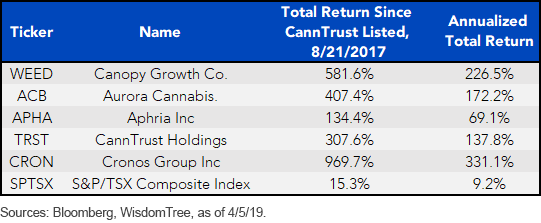
By Jeffrey Weniger, WisdomTree Investments
Special to the Financial Independence Hub
Live by market capitalization-weighting, die by market-capitalization weighting.
If you own a broad-based Canadian beta tracker, chances are you own upwards of five marijuana stocks.
Canopy Growth, the largest player in TSX-listed cannabis companies, is up 78-fold since July 2010. Aurora Cannabis, the other major player, has “only” been a 24-bagger since 2007. But if you really want to cherry pick, from that company’s bottom when it was a penny stock in 2013, it is up 49,180%. Sure, no speculation there.
You might be accidentally playing this mania without even knowing it. The S&P/TSX Capped Composite Index also has Aphria, CannTrust and Cronos Group sprinkled in. Granted, we’re only talking about 1.5% of total capital in the industry, but this group is so volatile that it punches well above its weight. What if the dot-com-ness of figure 1 gets flipped on its head?
J.P. Morgan analyzed 13,000 companies that were members of the Russell 3000 Index from 1980 to 2014 and found that 40% experienced a “catastrophic” loss. That means a decline of 70% or more in the price of a stock from its peak, after which there was little recovery such that the eventual loss from the peak was 60% or more.
What are your prime candidates for catastrophic loss? The Big Five banks? The rails? How about some companies that came out of nowhere, in a brand-new industry, owned by your not-around-during-dot-com next-door neighbour?
Think about catastrophic loss as you consider the outlook for the two biggies, Canopy and Aurora, in figure 2. I added the only other large Canadian health care firm (Bausch, the former Valeant), along with a few completely unrelated companies for some context.
Figure 2: Earnings per Share & P/E
The cannabis bulls will tell you that earnings in the coming years is not the proper valuation measure. But who among us knows what the marijuana world will look like down the road? I’m hard-pressed to see how Molson Coors, PepsiCo, Merck, British American Tobacco, or any of a dozen other giants will not try to get their hands on the pile of money that is supposedly sitting on the table.
Nevertheless, here are the revenue projections. If the Street is right, Canadian Tire, the retailer, will have 17 to 18 times the revenues of either Canopy or Aurora in 2020. Yet its total value is lower than both of them. Maybe I don’t “get it.” But the biggest TSX-listed marijuana company is changing hands for 22x Street consensus sales figures for 2020: and that number presupposes that revenue will more than triple in 2020 from this year’s projected sales. Colour me skeptical.
The S&P/TSX Composite has about 1.5% in marijuana companies. That doesn’t sound like much. But what if catastrophic loss looms? These companies can easily be an accidental headache that lops off a full performance point or more from an index fund if marijuana in 2019 is anything like dot-coms in 2000.
Figure 3: Street Consensus Revenue
 Jeff Weniger, CFA serves as Asset Allocation Strategist at WisdomTree. Jeff has a background in fundamental, economic and behavioral analysis for strategic and tactical asset allocation. Prior to joining WisdomTree, he was Director, Senior Strategist with BMO from 2006 to 2017, serving on the Asset Allocation Committee and co-managing the firm’s ETF model portfolios. Jeff has a B.S. in Finance from the University of Florida and an MBA from Notre Dame. He is a CFA charter holder and an active member of the CFA Society of Chicago and the CFA Institute since 2006. He has appeared in various financial publications such as Barron’s and the Wall Street Journal and makes regular appearances on Canada’s Business News Network (BNN) and Wharton Business Radio.
Jeff Weniger, CFA serves as Asset Allocation Strategist at WisdomTree. Jeff has a background in fundamental, economic and behavioral analysis for strategic and tactical asset allocation. Prior to joining WisdomTree, he was Director, Senior Strategist with BMO from 2006 to 2017, serving on the Asset Allocation Committee and co-managing the firm’s ETF model portfolios. Jeff has a B.S. in Finance from the University of Florida and an MBA from Notre Dame. He is a CFA charter holder and an active member of the CFA Society of Chicago and the CFA Institute since 2006. He has appeared in various financial publications such as Barron’s and the Wall Street Journal and makes regular appearances on Canada’s Business News Network (BNN) and Wharton Business Radio.
Commissions, management fees and expenses all may be associated with investing in WisdomTree ETFs. Please read the relevant prospectus before investing. WisdomTree ETFs are not guaranteed, their values change frequently and past performance may not be repeated. Past performance is not indicative of future results. This material contains the opinions of the author, which are subject to change, and should not to be considered or interpreted as a recommendation to participate in any particular trading strategy, or deemed to be an offer or sale of any investment product and it should not be relied on as such. There is no guarantee that any strategies discussed will work under all market conditions. This material represents an assessment of the market environment at a specific time and is not intended to be a forecast of future events or a guarantee of future results. This material should not be relied upon as research or investment advice regarding any security in particular. The user of this information assumes the entire risk of any use made of the information provided herein. Neither WisdomTree nor its affiliates provide tax or legal advice. Investors seeking tax or legal advice should consult their tax or legal advisor. Unless expressly stated otherwise the opinions, interpretations or findings expressed herein do not necessarily represent the views of WisdomTree or any of its affiliates. “WisdomTree” is a marketing name used by WisdomTree Investments, Inc. and its affiliates globally. WisdomTree Asset Management Canada, Inc., a wholly-owned subsidiary of WisdomTree Investments, Inc., is the manager and trustee of the WisdomTree ETFs listed for trading on the Toronto Stock Exchange.



